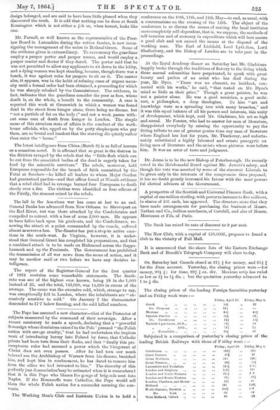At the Royal Academy dinner on Saturday last Mr. Gladstone
happily broke through the traditions of flattery to the living which those annual solemnities have perpetuated, to speak with great beauty and pathos of an artist who has died during the year, Mr. Dyce. "There was no element, no incident, con- nected with his works," he said, "that rested on Mr. Dyce's mind so little as their price." Though a great painter, he was not a painter alone. He was a good musician, a good archi- tect, a philosopher, a deep theologian. To him "art and knowledge were as a spreading tree with many branches," and it was this equal balance of all his powers and interests, this unity of development, which kept, said Mr. Gladstone, his art so high and sound. Mr Forster, who had to answer for men of literature, disappointed everybody by missing the opportunity to pay the fitting tribute to one of greater genius than any man of literature whom England has lost for years, Mr. Thackeray, and unfortu- nately substituted a highly laboured and ornate panegyric on living men of literature and the artists whose pictures were before him. It was an error of taste and judgment.






























 Previous page
Previous page